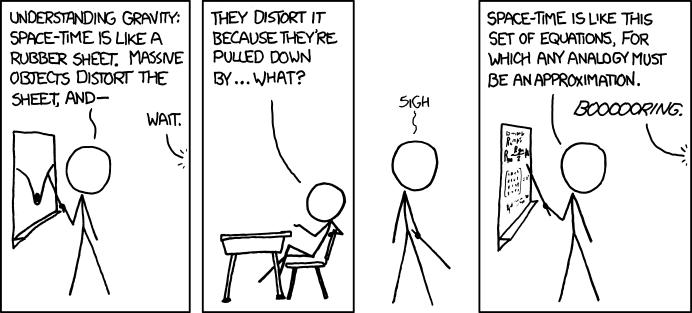The original melody was written by Pete Seeger, but the lyrics come from Ecclesiastes 3.1-8: "For everything there is a season, and a time for every matter under heaven..." There is a time for constructive acts of all sorts, as well as acts of destruction. Everything goes in cycles created by and comprehensible only to God. These resonate on earth for humans to interpret and to live by. The theology of Ecclesiastes seems to be optimistic existentialism; there is no way for humans to understand God's plan, but this is not a cause of despair:
He has made everything suitable for its time; moreover, he has put a sense of past and future into their minds, yet they cannot find out what God has done from the beginning to the end. I know that there is nothing better for them than to be happy and enjoy themselves as long as they live; moreover, it is God’s gift that all should eat and drink and take pleasure in all their toil.The best that humans can do it to put their faith in God and enjoy what they receive, which includes the pleasures of food and drink as well as the work that humans must do. This advice seems practical: if you are going to do something you entire life, you might as well enjoy it! But why exactly is this the message?
(Ecclesiastes 3.11-13)
The ancient Greeks had an idea of kleos, or "glory" as a way to transcend death. Men who built up kleos during their lifetime were remembered after their death as being heroic - men like Achilles.
Kleos can be seen as a means of coping with death. One who was valiant during this lifetime would live on afterward in the words of others, his story ideally passed down through the generations as the spirit of the man resided eternally in gloomy Hades.
The Hebrews did not have this same sense of honor, though the prospect of death is very similar to that of the Ancient Greeks. Rather, their lives were to be lived piously, in constant observance of God's law. The force of life was the covenant, and in a way, perhaps, the Hebrews lived on as a community through their special relationship with God. Deliverance, during the fifth to third century BCE, would happen during lifetime, if at all. Heaven was God's abode, not the eternal resting place of the faithful.
Having no great anticipation of reward after death, it is easy to see life and all its constituent parts as hevel, literally meaning "breath," "breeze," "vapor," or "mist." In the Harper Collins Study Bible translation of Ecclesiastes, hevel appears as "vanity," though the connotation is along the lines of "meaninglessness," "absurdity," "emptiness," "incongruity," or "uselessness."
How do we deal with a life bereft of meaning? We must find some meaning in it, and that meaning turns out to come from God. It is God that controls everything, and all good things that come from God should be enjoyed. Wise people understand this, and are wise because of it (a tautology that actually exists in the pages of Ecclesiastes). Therefore, people should be wise by following God and enjoy all that God gives: food, wine, pleasure, as well as work.
There is nothing better for mortals than to eat and drink, and find enjoyment in their toil. This also, I saw, is from the hand of God, for apart from him who can eat or who can have enjoyment? For to the one who pleases him God gives wisdom and knowledge and joy; but to the sinner he gives the work of gathering and heaping, only to give to one who pleases God. This also is vanity and a chasing after wind.The Israelite is to enjoy toil because toil was bestowed by God. The Israelite is also to enjoy food and wine, because this too was bestowed by God. One who pleases God is rewarded and gains wisdom and joy. One who does not please God is miserable.
(Ecclesiastes 24-26)
This is the two-fold message of Ecclesiastes: that wisdom wins the favor of God/is bestowed by God and that humans should enjoy what they are given. Now down to the nitty-gritty details:
Ecclesiastes features both an introduction and an epilogue, with the main teaching marked on either end by the saying of the Teacher: "Vanity of vanities;" "all is vanity." (Ecclesiastes 1.2; 12.8). This literary device is known as envelope structure, as the contents of the text resides within (and is informed by) the idea that "all is vanity." This could be a distressing or disappointing background, but the author of Ecclesiastes assures us that though everything is meaningless for humans, God imbues everything with meaning. Therefore, humans are to appreciate the gifts of God: food, drink, and even work, and seek knowledge by obeying God's commandments.
We read in the introduction to Ecclesiastes in the Harper Collins Study Bible that "The social, economic, and political evidence in the book points to a time of change and upheaval, of risk and possibility" - possibly around the 5th century BCE. (890). Hence there is a reaction by the author to assert that "there is nothing new under the sun." When there is upheaval, it is all part of God's cycle, which has existed and exists for all eternity. These words would offer a measure of consolation in a rapidly-changing world. As we see, "The book emphasizes the value of rationality despite the irrationality of life" (892).
Part of this rationality is established at the outset with verse that invokes the creation story. We feel the primordial rhythms: the rising and setting of the sun, the blowing of the wind (as the spirit of God blows over the waste waters in Genesis 1), and the streams running to the sea. In all this surely life and effort seem futile. The narrator remarks,
What has been is what will be,God's wonders extend beyond this:
and what has been done is what will be done;
there is nothing new under the sun.
(Ecclesiastes 1.9)
the eye is not satisfied with seeingwith modern scientific knowledge, this seems quite obvious, as we know that the brain processes and stores perceptions of sight and sound. However, to the author, this idea represents something marvelous. Mundane containers generally fill up, but God-created vessels like the ocean and ears and eyes do not fill up. They have a special God-given property that allows them to keep taking in, little black holes of creation. This is a proof of God's special powers, testament to his control over all the earth. For the author of Ecclesiastes, God is in control. Rather than trying to understand God's ways, we should accept God's laws and try to be wise. While we are on this earth, we should enjoy what we are given. Even work is a gift from God.
or the ear filled with hearing.

